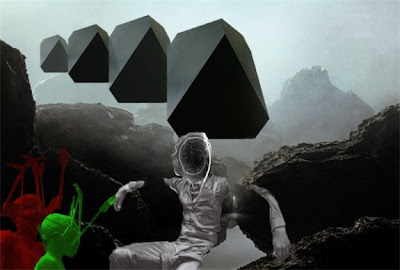This is a review i wrote for my school's newspaper. It's been edited now, so this is the beginning product. It was written fairly quickly and ideas were bouncing all around so sorry if it seems unbalanced, rushed, or jumbled.
 Shabazz Palaces “Black Up” Review
Shabazz Palaces “Black Up” Review
The past year or so has been an interesting time for Hip Hop. Odd Future has become a strange global entity, with Tyler, the Creator winning Best New Artist at the VMA’s; Lil B has put out more material than most artists release in a lifetime; and Prince Ea has stayed consistently bizarre yet brilliant with “The Brain”, a rap studying the mind’s functions and mystique, and “Backwards Rappers”, a forwards/backwards verse with two conflicting messages of street vs. book values. Right alongside these recent rap vanguards is Shabazz Palace’s terrific album, “Black Up”, which challenges rap conventions, new and old, while embracing them both.
Shabazz Palaces is a project of rapper Butterfly, who is a former member of the acclaimed alternative Hip Hop group Digable Planets. The project is shrouded with mystery, with Palaceer Lazaro (Butterfly’s alias in the group) giving few non-elusive interviews and no other names than his own. The group’s philosophy is that the music should speak for itself, yet they seem to communicate with the same mask of ambiguity.
The lyrical style, for example, is oftentimes abstract or so fast paced it whirs by, like if internet data could take physical form. While the album does contain more traditional song conventions – such as the boy-meets-girl tale of “A treatise dedicated to the Avian Airess from North East Nubis (1000 questions, 1 answer)” or the blatant, open ended dis “yeah you”—they often either have no chorus or are characterized with the consistent theme of futuristic/astrological, Sci-fi titles or language. He also satirizes rap’s focus and intent while embracing its hustle and spirit (“At a tender age/ We learn to turn the page/ To mind the screen and stage/… Find your spot in the shade/ And n***a, get paid” – (Felt), not to mention the paradoxical assertions of “free press and curl”).
The lyrical content itself, however, is usually down to earth and familiar, dealing with the ever-present topic in Hip Hop: Hip Hop; as in its present state, and where it’s headed. While I would usually find this subject a useless flaunting of unearned bragging rights, Shabazz do it in a fresh, creative manner, and are even positive about it: “It’s gonna be big movements from below/ the golden age lies ahead” (which contradicts the belief that the Golden Age of Hip Hop was the late 80’s into the early 90’s).
This is achieved in multiple, often subtle manners. Part of the lyrical contribution has been covered, with the other part being the aesthetic value. A philosophy rooted in the music of free jazz musician Sun Ra and funk lords Parliament Funkadelic, Afrofuturism is an artistic form which utilizes Sci-fi, historical fiction, and magical realism (with non-Western cosmologies) to represent the African American’s sense of isolation and skepticism in an intolerant world, utilized to critique the state of the aforementioned community and reexamine past events in their history; a constant factor with Lazaro’s content, style, and persona.
The beats also portray this complex representation of African American feelings, with their homages to past forms mastered with modern mindedness and gifts from the astral planes of the future. The rhythms are tribal at times, with haunting chanting and heavy percussion, reminiscent of African mysticism (“Konjo Konjo Konjo” - “free press and curl”). There are also some throwbacks to psychedelia, as in “(Felt)”, and even slinky, sleazy jazz makes in appearance in “Endeavors for Never (the last time we spoke you said you weren’t here. I saw you)”, one of the most experimental tracks on the album (that’s saying a lot). The beats can also make Lazaro’s already distorted voice seem to flow smoothly yet oddly offbeat, living within the music as if the protagonist of Invisible Man. Another notable consistency in the production is the constant progression the beats have. When the beats shift, they often never look back, constantly keeping the listener guessing (possibly acting as a symbolic exemplar for the ideal future of Hip Hop).
Palaceer Lazaro, I’ve concluded, is Hip Hop in all its aspects; he is not afraid to embrace its early African griot roots, its old school smoothness (much of his flow and rhyme scheme are simple and direct, right alongside the beats), and its modern ethos of hustle, individualistic pursuit, and ego. His distance from any one location, coupled with his obvious love and respect for the genre, has granted him a well-rounded approach for his persona. He and his palace, therefore, have constructed a pure Hip Hop album, one a lover of the genre will surely appreciate.